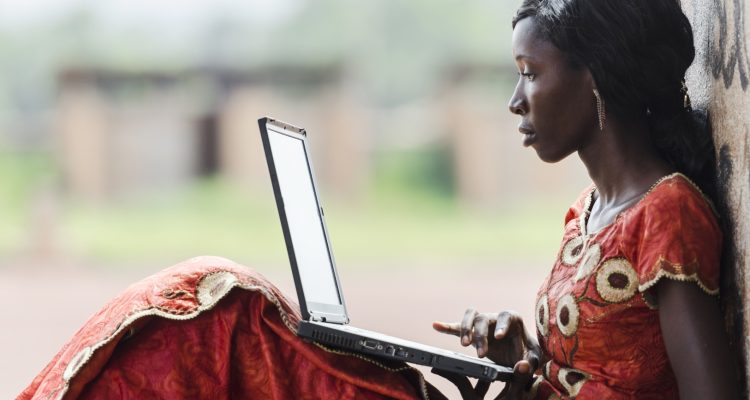En Afrique, l’accès à internet constitue un véritable enjeu de développement. Durant les dix dernières années, la connectivité sur le continent africain a connu une évolution significative. Les réseaux de téléphonie mobile ont largement contribué à démocratiser l’accès à internet, qu’il s’agisse des zones urbaines et rurales, voire également celles reculées. Où en est donc l’Afrique par rapport à l’accès à internet ?
Internet et l’Afrique en 2017
En l’espace de 15 ans (entre 2000 et 2015), le taux de pénétration d’internet au niveau mondial est passé de 6,5 % à 43,4 %. Désormais 3,2 milliards de personnes disposent d’un accès à internet. Dans les pays en voie de développement, le chiffre de 2 milliards de personnes est avancé.
Néanmoins, malgré la hausse de la pénétration d’internet, de nombreuses populations n’y ont toujours pas accès. Trente-trois pays subsahariens sont confrontés à la problématique de l’accès à internet.
Sur le continent africain, environ 20,7 % de la population bénéficie d’un accès à internet. Cela signifie donc que plus de 872 millions d’Africains ne disposent toujours pas de connexion internet.
La plus large majorité des internautes subsahariens se connectent à internet à l’aide de leur téléphone portable. Ce comportement s’explique par différents facteurs :
- Faiblesse voire inexistence de réseaux filaires adaptés.
- Coût très élevé de la taxe ADSL.
- Tarif élevé des périphériques (tablettes et ordinateurs fixes et portables).
En Afrique subsaharienne, plus de la moitié de la population (65 %) vit dans des zones reculées. Cette catégorie de population, dont le pouvoir d’achat est très faible, ne dispose pas d’accès à l’ADSL même si elles vivent dans des localités desservies. Le coût de la connexion étant bien trop élevé pour elles.
Le réseau mobile à l’origine du développement d’internet en Afrique
Des millions d’Africains se tournent vers les réseaux mobiles pour se connecter à internet. Cette réalité s’explique par la large couverture proposée par ces derniers associée à une accessibilité financière. Les coûts demeurant relativement raisonnables.
Selon une étude réalisée par le World Economic Forum, 97 % de la population africaine possèdera un téléphone mobile d’ici à fin 2017. Les ventes de smartphones en Afrique connaissance une progression importante. Ce phénomène s’explique par les investissements effectués par des entreprises africaines reconnus (Orange, Etisalat, etc.) et la diversification des offres.
Les géants américains tels que Facebook et Google, conscients des intérêts que ce marché peut leur offrir, investissent massivement en Afrique.
Quelle stratégie Google envisage-t-il de mettre en place ?
L’Afrique compte plus de 910 millions d’abonnés au téléphone mobile. Google a déjà mis en place différents types de projets en Afrique. Avec l’initiative « Project Link », Google se fixe pour objectif de fournir un accès internet à l’ensemble du continent africain pour permettre aux populations de bénéficier d’un accès à internet à faible coût.
Toutefois, Google ne souhaite aucunement se positionner en tant que fournisseur d’accès internet. Il privilégie la mise en place de partenariat avec les entreprises locales. La seconde initiative mise en place par Google concerne « Project Loon » qui vise à fournir un accès internet à l’aide de ballons survolant les zones difficiles d’accès. Cette solution a déjà été testée aux États-Unis, au Pérou, Nouvelles Zélande et Sri Lanka. Le partenariat s’effectue avec des opérateurs spécialistes de la téléphonie mobile.
L’exemple du Kenya
Le Kenya est reconnu comme le pays proposant la meilleure connexion internet de la région AME (Afrique et Moyen-Orient). Cette performance s’explique par la mise en œuvre de la stratégie nationale du haut débit, implémentée conjointement par le secteur privé et le gouvernement kenyan.
Cette coopération permet ainsi aux Kenyans d’accéder à la fibre optique sur l’ensemble du territoire. Ils bénéficient également de la possibilité d’opter pour la 4G fournie par les opérateurs téléphoniques locaux.
Quelles sont les perspectives envisageables ?
L’accès à internet demeure toujours marginal en Afrique. Différents axes de développement peuvent être envisagés. Une coordination inter-États pour une meilleure gouvernance internet doit être mise en place. Celle-ci doit permettre aux différents gouvernements africains de s’interroger sur l’usage de l’internet en Afrique, de nombreuses disparités existent toujours.
Malgré une connectivité plus large, le prix des connexions demeure bien souvent beaucoup trop élevé pour les populations locales, à l’exception des pays bordants le littoral (Ghana, Afrique du Sud, Somalie). Cette différence de prix s’explique par le fait que ces états se situent non loin des câbles de fibre optique, de fait les tarifs appliqués sont très inférieurs à ceux pratiqués dans les autres pays.
Certains gouvernements tels que le Bénin ont pris la décision d’intervenir à plusieurs niveaux : obligation pour les opérateurs de faire des efforts pour fournir une meilleure qualité de services, transparence des tarifs, etc.
De plus, il est nécessaire d’apporter des améliorations aux infrastructures locales. Ces dernières sont inexistantes dans quelques pays ou obsolètes dans d’autres.
Malgré les initiatives mises en place telles que l’Alliance en faveur d’un internet abordable qui regroupe des acteurs issus des secteurs privé et public, celles-ci demeurent très marginales.
Pour offrir à l’ensemble des Africains un accès internet de qualité, il est essentiel de développer des partenariats entre les États et les acteurs locaux issus du secteur privé et d’équiper les pays africains avec les infrastructures adéquates.

